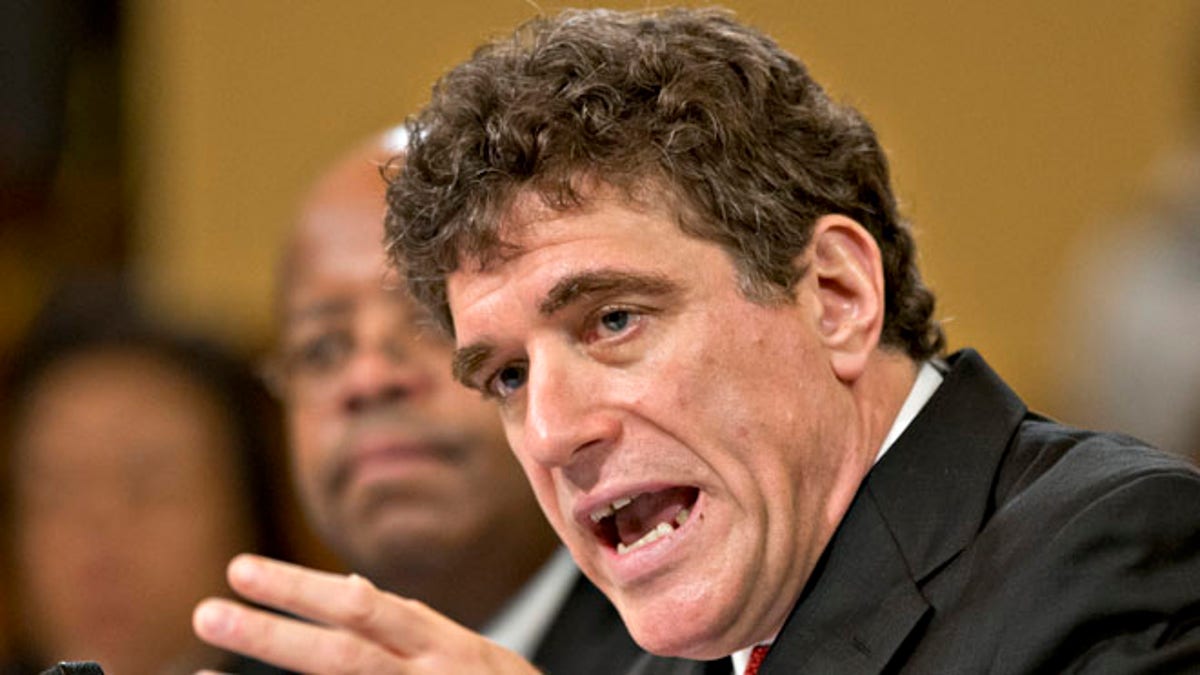
FILE: May 17, 2013: Ousted IRS chief Steven Miller testifies on Capitol Hill in Washington, D.C. (AP)
The IRS' upper management was behind the controversial decision to use a planted question to disclose the agency's practice of singling out conservative groups, according to transcripts of interviews reviewed by Fox News.
Holly Paz, who had been a Washington supervisor in the agency's tax-exempt unit, told House oversight committee officials that Lois Lerner -- the director of that division -- told her ahead of time that she would be addressing the targeting of Tea Party and other conservative groups.
Lerner told Paz that then-IRS Commissioner Steve Miller had contrived an approach, though did not go into detail during her interview behind closed doors with House lawyers.
Paz told the House panel that Lerner informed her that "she and (Miller) had discussed her addressing it and decided what she would say about it."
Lerner would go on to address the issue, after using a planted question during an American Bar Association (ABA) event at a Washington, D.C., hotel on May 10.
House investigators asked Paz if Miller specifically requested Lerner to bring up the issue at the ABA meeting.
"I don't recall if she said that he asked or that they agreed," said Paz.
House lawyers then asked Paz if Lerner spoke willingly to the ABA about how the IRS handled the applications of conservative organizations.
"She did it. I don't know if she was directed," replied Paz. "She didn't say no."
Miller has since expressed regret for using the planted question. During a Senate hearing last month, Miller called it an "incredibly bad idea." He acknowledged the agency was trying to get ahead of the scandal, though did not specify his role in strategizing at the time. Miller resigned his post after the scandal broke.
At the ABA event, tax lawyer Celia Roady asked Lerner about concerns over Tea Party applications for tax-exempt status. At that point, Lerner said that they saw an "uptick" in those sorts of applications and that they "used names like Tea Party and patriots and they selected cases simply because the applications had those names in the title. That was wrong, that was absolutely incorrect, insensitive and inappropriate."
Paz, who is the employee who also acknowledged having reviewed some of those applications, told the House Oversight Committee that employees at the IRS's Cincinnati office were not "political" and did not make their judgments based on partisanship.
"They were not even aware of you know, politics. Being outside of Washington, it was not something that they followed or had interest in," Paz said.
Because they are so apolitical, they are not as sensitive as we would like them to be as to how things might appear."
Paz also told the panel that the rubric crafted to reflect "Tea Party" applications was not partisan.
"It was really just an efficient way to refer to this issue. They all understand the real issue was campaign intervention," Paz said. "Just sort of a shorthand reference. You know, I think they may have referenced, you know, it's like calling soda 'Coke' or, you know, tissue 'Kleenex.' They knew what they meant and the issue was campaign intervention."
Paz says that the Cincinnati team was "short-staffed" and "they're always looking for efficiencies and they thought that using the BOLO list as a way to sort of track things that they needed to be aware of was an efficient way to do that, and in their minds, they knew what this, the criteria they used meant."
BOLO was an acronym the IRS created for "Be on the Lookout" as they adjudicated these types of requests for tax-exempt status.
Paz also said that Cindy Thomas, who headed the Determinations Unit in the Cincinnati Office, asked Paz and other officials to focus on new organizations which were eligible to apply for tax-exempt status. These groups are commonly referred to as 501(c)(4)'s.
"Political campaign intervention in 501(c)(4)s was not something we had previously dealt with much. The vast majority of applications we get are from 501(c)(3) organizations," Paz said. "Political campaign intervention for (c)(3)s is a more straightforward analysis, it's completely forbidden, which you know, narrows the issue a great deal. So 501(c)(4), you know, having to decide first what is political campaign intervention and how much of it, you know, can an organization do before its primary activity is not social welfare was an issue that they had not dealt with much in EO Determinations to that point."
Paz adds that she knows Cincinnati adjudicators "were waiting for guidance" on how to handle the influx of 501(c)(4) applications and how to judge them. But she didn't know they were creating a delay by not being reviewed in Cincinnati.
"I did not know they were not working the cases because what had been done previously was, they were working the cases in consultation with Washington. And I was under the impression that was continuing," Paz said.
The transcripts also show that about 10 tax-exempt applications were released inappropriately from the Cincinnati office to a reporter from ProPublica, a Pulitzer Prize-winning news organization.
Information regarding tax-exempt organizations is public. But denials and the applications themselves while in the pipeline are not. The transcript redacted the name of the Cincinnati employee who improperly released the applications. Paz said the Cincinnati employee was "issued a formal admonishment" for releasing the applications.
It is not known which applications were released or why ProPublica took interest in those particular organizations.











































